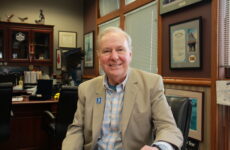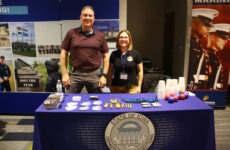In a lot of sub-Saharan African villages, being able to afford one meal a day was the norm. However, thanks to developmental economist Dr. Andrew Mude, that all began to change in 2010.
Dr. Mude, this year’s World Food Prize winner and an economist from Kenya, spoke to DMACC students
and faculty on October 12 about how he used satellite data to insure livestock in Africa to help fight the effects drought had on farmers and their families.
The World Food Prize is an award that has been handed out for the last five years in honor of Norman Borlaug. Borlaug has been credited with saving over one billion lives because of his work to help maximize crop production and reduce famine.
The World Food Prize honors men and women for field research and application in agriculture.
Dr. Mude is being recognized as a World Food Prize winner for his work to bring the first forms of insurance to African villages, helping the farmers continue to profit off their livestock even through seasons of drought.
Rolling off Borlaug’s motto of “take it to the farmer,” Dr. Mude and his team started with educating the African people about insurance and
then convince them that investing in it would ultimately “save their lives,” according to Mude.
On the issue of affording insurance premiums and payments, Mude emphasized that they’ve got to “sell one to save the herd.”
Payments were then handed out through a smart phone app, and the African farmers finally had a risk management program to help them feed their families during the drought seasons.
The first forms of insurance in Africa were rolled out in January of 2010. In the first month, 2000 policies were sold.
Currently, thanks to the work of Dr. Mude and his team, over 12,000 households are being insured in sub- Sahara Africa.
Dr. Mude closed with, “the experience of receiving something in return for their commitment is what’s building that trust. We wouldn’t be where we are without the trust, and the trust is saving lives.”





Comments